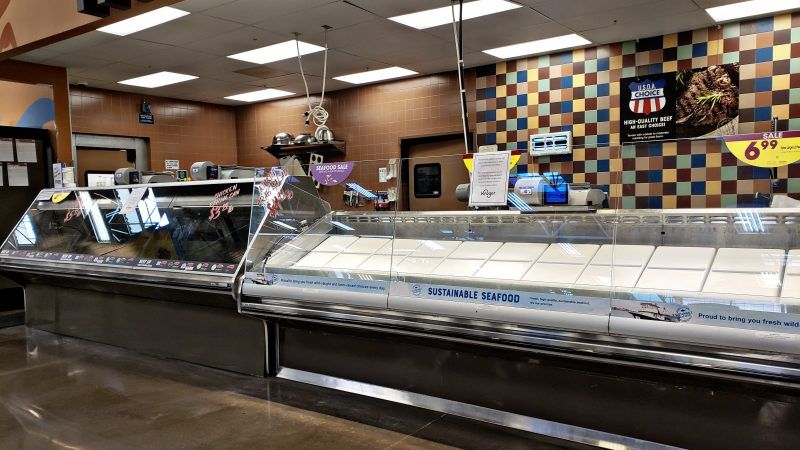Mandated Pandemic Hazard Pay for Grocery Store Workers Prompts Store Closures, Lawsuits
California grocers have filed three lawsuits against local laws requiring "hero pay" during the pandemic.

California's grocers are up in arms about city-level hazard pay laws that require them to compensate employees with "hero pay" wage premiums during the pandemic.
The California Grocers Association (CGA) has filed several suits in federal court to overturn these laws, while individual companies have announced that the new costs are forcing them to close stores.
On Wednesday, the CGA filed a lawsuit challenging the City of Oakland's ordinance. The law, which passed on Tuesday and goes into effect immediately, requires some grocers to pay their workers a $5 hourly premium on top of whatever wage they were making before.
The law applies to employees at any "large grocery store," defined as any store with at least 15,000 square feet that "sells primarily household foodstuffs for offsite consumption." The law only applies to stores operated by companies with 500 or more employees nationwide.
Employers will be on the hook for that hazard pay until Oakland qualifies for the "yellow" tier in California's Blueprint for a Safer Economy reopening scheme, which places counties in one of four color-coded tiers based on the severity of the pandemic. Yellow, the least restrictive tier, is supposed to indicate minimal spread of COVID-19.
The CGA's complaint makes two arguments against Oakland's hazard pay law. One is that it's preempted by the National Labor Relations Act. Another is that the law violates the Fourteenth Amendment's Equal Protection Clause by requiring only some grocery stores to pay the extra $5 an hour.
This, the suit says, has nothing to do with the city's stated goals of protecting workers and everything to do with rewarding a connected interest group of employees represented by the United Commercial and Food Workers (UFCW).
"By design, the Ordinance picks winners and losers. It singles out large grocery companies with unionized workforces (i.e., UCFW 5's members) without providing any reasonable justification for the exclusion of other employers or frontline retail workers," reads the complaint. "The City's stated objectives are merely an attempt to impose a public policy rationale on interest-group driven legislation for labor unions."
The CGA has raised near-identical claims in two other lawsuits. One was filed against the city of Long Beach last month. The other, launched yesterday, targets the city of Montebello. Both jurisdictions are requiring grocery stores to pay workers an extra $4 per hour in hazard pay.
On Monday, the grocery store chain Kroger's announced that it would be closing two grocery stores it operates in Long Beach, a Ralph's and a Food 4 Less, because of the increased costs imposed by the city's hazard pay ordinance.
A spokesperson for the company told the Los Angeles Times it had already spent $1.3 billion throughout the pandemic on bonus pay to workers and on safety measures to protect employees. From March through May of last year, the company provided a $2-an-hour pay bump, which was replaced by one-time bonus payments later that year.
Those store closures haven't dissuaded cities from moving ahead with their own hazard pay laws. Proponents argue any store closures are just a scare tactic.
"They absolutely can afford this increase," Los Angeles Councilman Paul Koretz said at the Tuesday city council meeting where a $5 hazard pay increase for grocery store workers was approved, reports the Times. "They absolutely should be paying this increase. And if they shut down stores, it's just out of spite."
It's a strange theory that grocery stores are greedy enough not to want to pay out hazard pay, but not so greedy that they don't mind shutting down profitable stores out of "spite."
The more likely possibility is that companies are shutting down stores that can't absorb a sudden, massive increase in their labor costs.
Grocery store workers are obviously operating under increased risks during the pandemic, and there's an understandable desire to want to reward them for that extra assumption of risk.
But COVID-19 doesn't eliminate the trade-offs and unintended consequences that come with top-down wage controls.
Some grocery store workers will see pay increases under these policies, while others will lose their jobs or have their hours cut. Consumers, many of whom are themselves struggling with the pandemic's economic fallout, will absorb these pay increases through higher prices or avoid them by shopping at stores that aren't subject to the mandates.
Even in a pandemic, central planning is hard.
